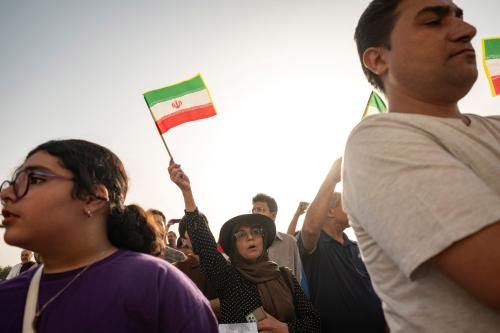In a striking understatement about North Korea’s nuclear weapons development programme, Dick Cheney, US vice-president, said in April that time was “not necessarily on our side”. Donald Rumsfeld, US defence secretary, put it more bluntly—and accurately—this month, remarking: “Needless to say, time favours North Korea.” And that was before news of Pyongyang’s successful test of the main engine of its long-range ballistic missile.
The Bush administration has responded in strangely inapposite ways to this gathering threat. It plans to withdraw a third of the US military forces based in South Korea; and it intends to deploy a ballistic missile defence in Alaska. There are reasons for this gap between awareness of the dangers and willingness to act on it. Mr Rumsfeld wants to reorganise US force deployments while he is still in office. The reorganisation is proceeding with Washington’s customary insensitivity to the opinions of old allies, in Europe as well as in Korea. The administration’s failure, meanwhile, to move aggressively to negotiate a settlement over North Korea can be attributed to a mix of divided counsel, ideology, the “anything but Clinton” syndrome and heavy US commitments to Iraq, all wrapped in the hope that North Korea can be kept on the back burner until after the US elections in November.
Meanwhile, Congress is planning its own version of a Korea policy. Two bills, if passed, would maintain trade sanctions and block humanitarian and other aid to North Korea until Kim Jong Il, the country’s ruler, changes the way he treats his people. No one could disagree with the objective, but one bill, as drafted, would undercut chances for a negotiated settlement. The other would allow a presidential waiver, recognising that many US interests are in play. The people of North Korea, tragically, would be the victims of well-intended policies that merely reinforce the wall around them.
With Washington increasingly out of step with its partners in north-east Asia, Mr Kim has been busy wooing public opinion on reunifying the nation. Many South Koreans and nearly every western visitor to the North have recently credited him with initiating economic reforms. Seoul’s engagement policy with Pyongyang, meanwhile, has resulted in expanded contacts and economic relations. But the South Korean government is also facing divisive questions about the future role of US forces in Korea, even while Washington is pressing it to deploy Korean troops to Iraq. Many South Koreans are beginning to look to China as a more reliable, long-term strategic partner.
The stakes for the US are much higher in this region than they were in Iraq. But a sense of resignation appears to have set in, despite Mr Rumsfeld’s pointed remark. Quite apart from North Korea’s growing nuclear capability, two other ominous developments are under way. First, Pyongyang is improving its ability to sell nuclear technology and materials through clandestine networks. Second, the US is losing the whole-hearted support of its other Asian partners in the six-party negotiations on denuclearising the Korean peninsula. Japan, while still loyally following the US lead in the negotiations, is moving toward economic relations with North Korea. Inevitably, US policies of economic sanctions and isolation of North Korea are becoming more difficult to adhere to.
China’s diplomacy has kept the talks going. Beijing is reported to be willing to use its negotiating capital to do that much, but tougher measures are unlikely. Incredibly, North Korea, despite its weak hand and arrogant behaviour, has improved its position in north-east Asia while the US has lost ground. No single action by the Bush administration can reverse this trend. But it would help greatly if Washington could show it is serious about dealing with the gathering threat.
At the forthcoming plenary meeting of six-party talks on North Korea, the US could strengthen its position by proposing specialised working groups to deal separately with issues such as a nuclear weapon-free Korean peninsula; forms of security assurances; and improving the economic welfare of both South and North Korean people.
Opponents of a comprehensive approach to the North Korean issue say the urgency of the problem requires a narrow focus on nuclear issues. We have tried that before without success. Time, indeed, is not on the side of peace and stability in north-east Asia. We have a right to expect something better from the key parties in the negotiations.
The Brookings Institution is committed to quality, independence, and impact.
We are supported by a diverse array of funders. In line with our values and policies, each Brookings publication represents the sole views of its author(s).



Commentary
Op-edThe U.S. is Losing Ground on Korea Talks
June 11, 2004